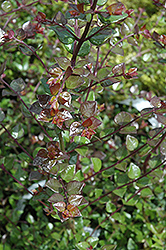Height: 5 feet
Spread: 5 feet
Sunlight:
![]()
![]()
Hardiness Zone: 6b
Other Names: Boxleaf Honeysuckle, Shrubby Honeysuckle
Description:
Mostly grown for amazing deep green foliage tipped with burgundy; foliage is reddish purple when it emerges in the spring; tubular white flowers provide nectar for butterflies and hummingbirds; makes a fantastic hedge; sometimes confused with cotoneaster
Ornamental Features
Red Tips Box Honeysuckle has attractive burgundy-tipped green foliage which emerges burgundy in spring on a plant with an arching habit of growth. The tiny glossy oval pinnately compound leaves are highly ornamental and remain green throughout the winter. It is draped in stunning lightly-scented creamy white tubular flowers at the ends of the branches in late spring. It produces deep purple berries in late summer.
Landscape Attributes
Red Tips Box Honeysuckle is a dense multi-stemmed evergreen shrub with a shapely form and gracefully arching branches. It lends an extremely fine and delicate texture to the landscape composition which can make it a great accent feature on this basis alone.
This shrub will require occasional maintenance and upkeep, and is best pruned in late winter once the threat of extreme cold has passed. It is a good choice for attracting butterflies and hummingbirds to your yard. Gardeners should be aware of the following characteristic(s) that may warrant special consideration;
- Insects
- Disease
Red Tips Box Honeysuckle is recommended for the following landscape applications;
- Mass Planting
- Hedges/Screening
- General Garden Use
- Groundcover
- Topiary
Planting & Growing
Red Tips Box Honeysuckle will grow to be about 5 feet tall at maturity, with a spread of 5 feet. It tends to fill out right to the ground and therefore doesn't necessarily require facer plants in front, and is suitable for planting under power lines. It grows at a medium rate, and under ideal conditions can be expected to live for approximately 30 years.
This shrub does best in full sun to partial shade. It does best in average to evenly moist conditions, but will not tolerate standing water. It is not particular as to soil type, but has a definite preference for alkaline soils. It is highly tolerant of urban pollution and will even thrive in inner city environments. This is a selected variety of a species not originally from North America.
Disclaimer - This resource is provided for informational purposes only and does NOT reflect current availability. Inventory varies seasonally, so we cannot guarantee that every plant will be in stock at all times - please contact your favourite GardenWorks location directly for current availability. It does not include our entire inventory of plants, so be sure to visit GardenWorks to see varieties that may not be represented on this list.

